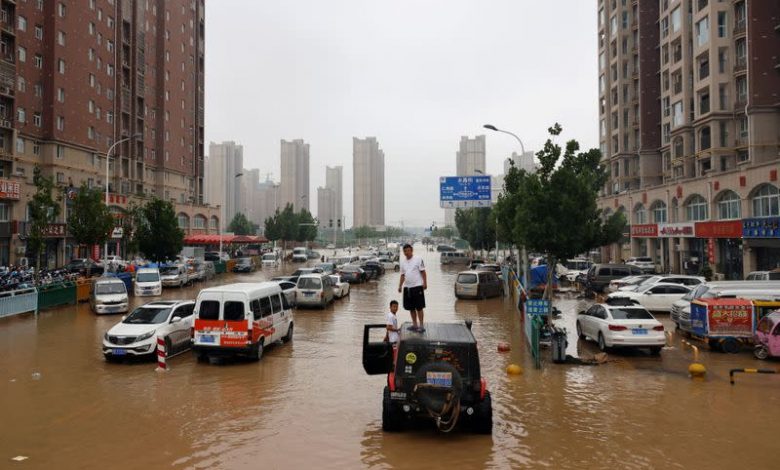‘Perilous moment’: Global supply chains buckle as variants and disasters strike

Events have conspired to drive global supply chains towards breaking point, threatening the fragile flow of raw materials, parts and consumer goods, according to companies, economists and shipping specialists.
The Delta variant of the coronavirus has devastated parts of Asia and prompted many nations to cut off land access for sailors. That’s left captains unable to rotate weary crews and about 100,000 seafarers stranded at sea beyond their stints in a flashback to 2020 and the height of lockdowns.
“We’re no longer on the cusp of a second crew change crisis, we’re in one,” Guy Platten, secretary general of the International Chamber of Shipping, told Reuters.
“This is a perilous moment for global supply chains.”
Given ships transport around 90 per cent of the world’s trade, the crew crisis is disrupting the supply of everything from oil and iron ore to food and electronics.
German container line Hapag Lloyd described the situation as “extremely challenging”.
“Vessel capacity is very tight, empty containers are scarce and the operational situation at certain ports and terminals is not really improving,” it said.
“We expect this to last probably into the fourth quarter – but it is very difficult to predict.”
Meanwhile, deadly floods in economic giants China and Germany have further ruptured global supply lines that had yet to recover from the first wave of the pandemic, compromising trillions of dollars of economic activity that rely on them.
The Chinese flooding is curtailing the transport of coal from mining regions such as Inner Mongolia and Shanxi, the state planner says, just as power plants need fuel to meet peak summer demand.
In Germany, road transportation of goods has slowed significantly. In the week of July 11, as the disaster unfolded, the volume of late shipments rose by 15 per cent from the week before, according to data from supply-chain tracking platform FourKites.
Companies were scrambling to free goods stacked up in Asia and in U.S. ports due to a confluence of crises, said Nick Klein, of freight and logistics company OEC Group.
“It’s not going to clear up until March,” Klein said.
Meanwhile, manufacturing industries are reeling.
Automakers, for example, are again being forced to stop production because of disruptions caused by COVID-19 outbreaks. Toyota Motor Corp said this week it had to halt operations at plants in Thailand and Japan because they couldn’t get parts.
Stellantis, the maker of Fiats, Peugeots, and Chryslers, temporarily suspended production at a factory in Britain because a large number of workers had to isolate to halt the spread of the virus.
The industry has already been hit hard by a global shortage of semiconductors this year, mainly from Asian suppliers. Earlier this year, the auto industry consensus was that the chip supply crunch would ease in the second half of 2021 – but now some senior executives say it will continue into 2022.
An executive at a South Korea auto parts maker, which supplies Ford, Chrysler and Rivian, said raw materials costs for steel which was used in all their products had surged partly due to higher freight costs.
“When factoring in rising steel and shipping prices, it is costing about 10 per cent more for us to make our products,” the executive told Reuters, declining to be named due to the sensitivity of the matter.
“Although we are trying to keep our costs low, it has been very challenging. It’s just not rising raw materials costs, but also container shipping prices have skyrocketed.”
Europe’s biggest home appliances maker, Electrolux , warned this week of worsening component supply problems, which have hampered production. Domino’s Pizza said the supply-chain disruptions were affecting the delivery of equipment needed to build stores.
The pandemic’s disruption has caused further effects within Britain, where large numbers of people order to self-isolate has halted business and delayed the distribution of goods and services.
British supermarkets said on Thursday that some products were in short supply and petrol stations had been forced to close after the official health app told hundreds of thousands of workers to isolate following contact with someone with COVID-19.
British newspapers carried front-page pictures of empty shelves in supermarkets, declaring a “pingdemic”.
Ports across the globe are suffering the kinds of logjams not seen in decades, according to industry players.
The China Port and Harbour Association said on Wednesday that freight capacity continued to be tight.
“South-east Asia, India and other regions’ manufacturing industry are impacted by a rebound of the epidemic, prompting some orders to flow to China,” it added.
A cyber attack hit South African container ports in Cape Town and Durban this week, adding further disruptions at the terminals.




